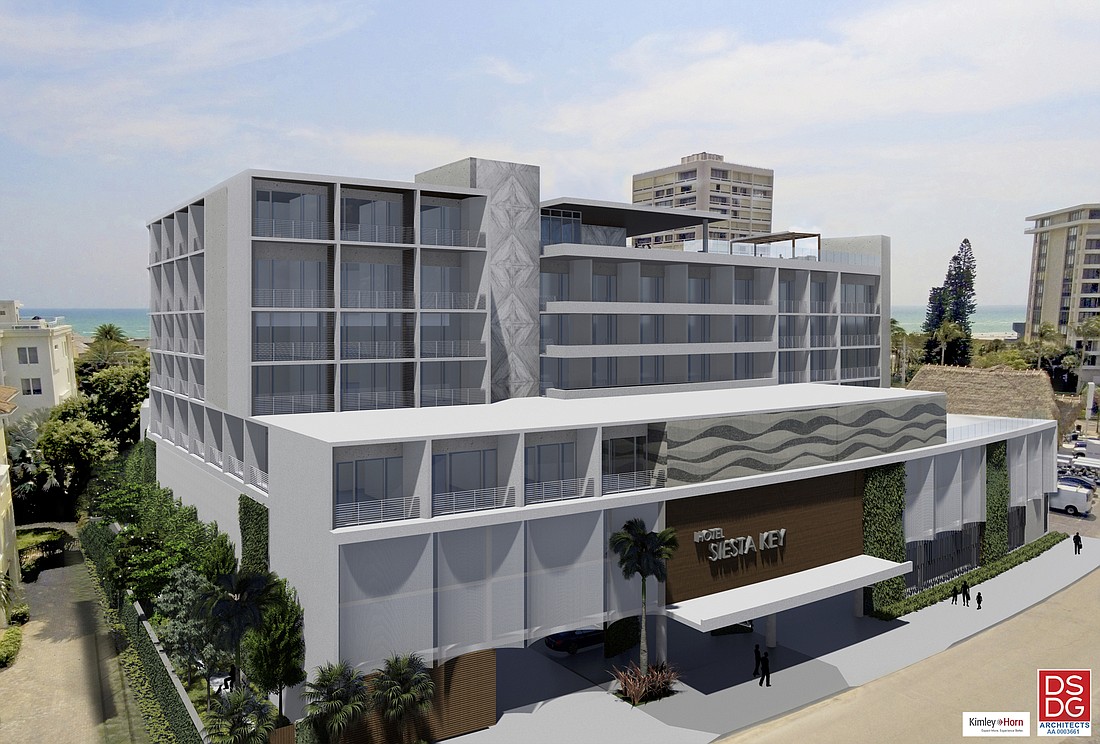- October 23, 2024
-
-
Loading

Loading

A Siesta Key resident has filed a lawsuit challenging the county’s approval of a hotel project in the island’s central business district.
On Nov. 24, Lourdes Ramirez submitted a complaint against Sarasota County in the 12th Judicial Circuit Court regarding the county’s Oct. 27 approval of an eight-story, 170-room hotel on Calle Miramar in Siesta Key Village. The suit argues the project would have adverse effects on Siesta Key and that the plans violate the county’s comprehensive plan.
The 13-page complaint cites several sections of the comprehensive plan, including one segment that states the intensity and density of barrier islands development shall not exceed the levels allowed under regulations in place on March 13, 1989. The 1989 regulations included a maximum density for hotel projects of 26 units an acre, which would put a 25-room cap on any hotel project on the .96-acre Calle Miramar property.
Initially, the developer of the Calle Miramar property submitted a proposed comprehensive plan amendment that would eliminate the 1989 standard for any hotels built on barrier islands properties carrying a zoning designation of commercial general. In May, however, representatives for developer Robert Anderson withdrew that application, and county staff determined the proposal could move forward without amending the comprehensive plan.
On Oct. 27, the County Commission voted to revise its development regulations to remove density calculations for hotel projects. Representatives for the developer argued density limits should apply only to residential projects, and that the hotel projects should be evaluated the same as any other commercial building.
Ramirez rejected that interpretation of county regulations, stating in her suit that the 1989 standards for hotel density should still apply to the development of the Calle Miramar site. After speakers at the Oct. 27 public hearing unsuccessfully made similar arguments, Ramirez expressed hope she would find a different outcome in the courts.
“I felt we had no choice but to take legal action now,” Ramirez said. “I didn’t see any other way to get the county to listen.”
The hotel plans on Siesta Key have drawn outspoken opposition from stakeholders in the area. The Siesta Key Association, the island’s largest resident group, organized against the proposals. Another group, the Siesta Key Coalition, formed specifically in response to the hotel concepts.
Although she has communicated with those groups previously, Ramirez said she was taking legal action independent of any other organization on Siesta Key. Ramirez said part of the reason for that was expediency.
“As an individual, it was easier for me to just go forward,” Ramirez said.
During the past several years, residents on and around Siesta Key have largely been unsuccessful in turning to courts in hopes of stopping projects they opposed. In 2019, the 12th Circuit denied a suit that argued the Siesta Promenade development on U.S. 41 did not comply with county regulations. Between 2018 and 2020, judges repeatedly turned away efforts from Siesta Key groups to block the dredging of Big Pass as part of a Lido Beach renourishment project, plans that the city and state approved.
Ramirez acknowledged that in many cases, courts grant local governments leeway to interpret regulatory language as officials see fit. When it comes to the Siesta Key hotel plans, however, Ramirez believes the applicable rules allow for only one interpretation — and that the Village project was improperly approved as a result.
“It’s not ambiguous at all,” Ramirez said.
The suit asks a judge to determine the development order related to the hotel project is inconsistent with the comprehensive plan and enjoin any development linked to that order.
The outcome of the suit could have ramifications for three other proposed hotel developments on Siesta Key, including a seven-story, 120-room project on Old Stickney Point Road the county endorsed in November.